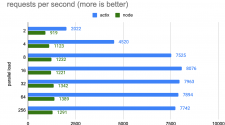India’s Insurance industry has been changing over the years, with IRDA doing a great job of driving a lot of product related changes and the changing technological environment coupled with an evolving customer base bringing with it a whole new set of challenges. Embracing newer technology has definitely enabled the health insurance sector grow at a rapid clip. The use of Technology in health insurance sector has not just provide ease of access to services for policy holders but also facilitated the introduction of newer services benefiting both the Insurers as well as policy-holders. Electronic claim filing, payment options, and web-based tools allow providers and health care consumers to manage their health care more effectively than traditional paper-based systems. Efficient use of technology has also enabled many Health Insurers to transition to the role of wellness providers, thereby changing the fundamental nature of their relationship with policy-holders. Some of the major technological tools used in the Health insurance are:
-
Use of Blockchain for Transparency :
Blockchain technology is set to transform the health insurance sector as it secures the integrity of patient data while at the same time enabling access to the different stakeholders in the healthcare ecosystem, right from Insurers, Hospitals and Laboratories to the patients themselves. It ensures end to end data security at the same time ensures there is no dependency on third parties thereby improving efficiency. This brings great operational efficiencies while dramatically cutting down on the chances of insurance fraud. This is a transformative technology in a sector like Insurance which is highly dependent on co-ordination between various intermediaries.
-
Wearable Tech and Smart Apps:
The rise of smart wearables coupled with increasing awareness about health in general are the two broad trends driving the health insurance industry forward. Fitness bands, Smart watches and other wearables monitor various health-related parameters in real time and make this data available to the wearer. Leveraging this health-related data and then planning relevant interventions has enabled Insurers to play a much more active role in the good health of their policy holders while also better managing their portfolio risks.
Insurers have now begun adopting a holistic approach to the health of their policy-holders, beginning with a Health Risk Assessment, that can be taken by policy holders online via a convenient chat interface or over the telephone. The Health Risk Assessment algorithm arrives at a score for every individual which establishes a baseline as far as the various lifestyle related parameters are concerned. Incidentally, the Health Score provided by WatchYourHealth is the most widely accepted Health Score in India. This Health Score can help identify the areas that need attention and can determine the interventions necessary to improve the policy holder’s health. There are also aspects of gamification, that leverage the pervasiveness of mobiles to enable policy holders to compete with their friends on the basis of things like steps take, weight lost, health score etc.
Insurers can enable policy holders to earn points basis their participation in various health initiatives and then also have points thus earned to be exchanged for reduced premium, increased cover or things like gym memberships etc.
This essentially helps Insurers improve persistence and engage with the policy-holders in a manner where the ambit of the relationship is widened from simply an insurance provider to someone who actually is interested in the policy-holder’s good health.
-
Application programming Interface (API):
APIs in health insurance play an important role in data management, that helps insurers in creating new ways to engage and connect with the policyholders through web, mobile, and social apps. APIs can also provide the data related to, policy holder’s eligibility, health, digital claim management, etc.
-
Use of Artificial Intelligence In Insurance:
AI has been a game-changer in a whole host of areas, and the health insurance sector is no different. Efficiently deploying AI enables Insurers to fast track claims, reduce the time and costs of processing while enhancing customer experience through smart automatization. AI also plays a critical role in detection of insurance fraud.
Disclaimer: The views expressed in the article above are those of the authors’ and do not necessarily represent or reflect the views of this publishing house. Unless otherwise noted, the author is writing in his/her personal capacity. They are not intended and should not be thought to represent official ideas, attitudes, or policies of any agency or institution.












